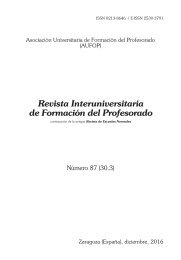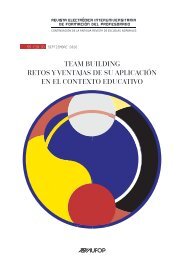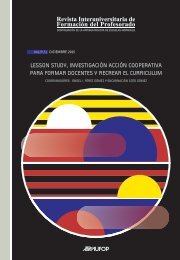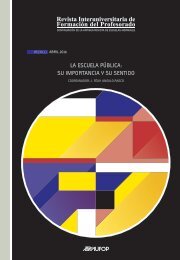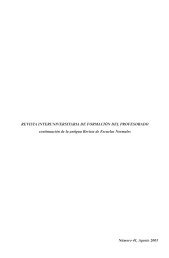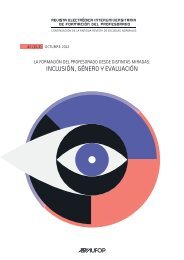PARA FORMAR DOCENTES Y RECREAR EL CURRICULUM
4qe5qrIwN
4qe5qrIwN
You also want an ePaper? Increase the reach of your titles
YUMPU automatically turns print PDFs into web optimized ePapers that Google loves.
Ángel Ignacio Pérez Gómez, Encarnación Soto Gómez y M.ª José Serván Núñez<br />
Lesson Studies: re-thinking and re-creating practical<br />
knowledge in cooperation<br />
ABSTRACT<br />
This paper aims to show the promising relationship between the processes generated by Lesson<br />
Study (LS) and the development of practical thinking in teacher training. We propose<br />
broadening the focus of Lesson Study from improving practice to reconstructing and improving<br />
the practical knowledge of teachers. The core issue of the analysis is the discussion on the<br />
relationship between practical knowledge, which is mostly unconscious, and practical thinking,<br />
which we use to describe and justify practice. One of the main findings of this research<br />
is that simply developing new conscious and informed ideas (theorising practice) does not<br />
suffice to transform the action; we also need to reconstruct the most internal attitudes, habits<br />
and beliefs through systematically including and repeating new practices and methods (experimentation<br />
of the theory). Lesson Study cycles become an exceptional tool in pre-service and<br />
in-service teacher training, because they link teachers’ professional development with curricular<br />
experimentation and cooperative self-training (Stenhouse, 1975).<br />
KEYWORDS: Teacher training, Lesson Study, Practical thinking, Practical knowledge,<br />
Theories in use.<br />
Pensamiento Práctico y Conocimiento Práctico.<br />
Compartimos programas y planes de estudio de formación de docentes con un<br />
intenso sesgo academicista. La mayoría de ellos no favorecen la formación del<br />
pensamiento práctico, eje de las competencias profesionales de los docentes, y<br />
ahondan el abismo entre la teoría y la práctica, es decir, entre las teorías declaradas<br />
por cada estudiante o docente y sus teorías en uso, aquellos conocimientos y<br />
estrategias que pone en acción cuando se encuentra en el escenario del aula (Zeichner,<br />
2010; Pérez Gómez, 2010; Hammerness, Darling-Hammong, Bransford,<br />
Berliner, Cochran-Smith, Mcdonald y Zeichner, 2005, Elliott, 2012).<br />
La distinción entre «reflexión sobre la acción» y «conocimiento en la acción» de<br />
Schön (1998), las aportaciones de Korthagen sobre la formación de las Gestalt<br />
informadas (2010), así como los descubrimientos más recientes de las investigaciones<br />
sobre neurociencia cognitiva (Damasio, 2010) nos llevan a indagar las dimensiones<br />
conscientes e inconscientes —conocimientos, habilidades, emociones,<br />
actitudes y valores— implicadas en la manera que tienen las maestras con las que<br />
hemos colaborado de percibir, interpretar, tomar decisiones y actuar en el escenario<br />
complejo de las interacciones de aula. ¿Ayudan las LS a desvelar y, en su caso,<br />
a reconstruir los componentes más implícitos del conocimiento en acción de los<br />
docentes?<br />
82 ISSN 0213-8646 • Revista Interuniversitaria de Formación del Profesorado, 84 (29.3) (2015), 81-101



